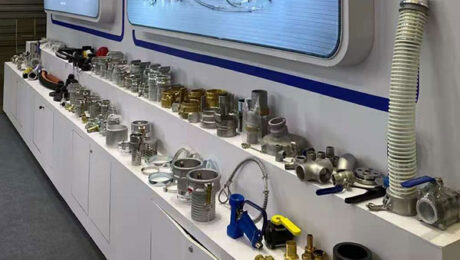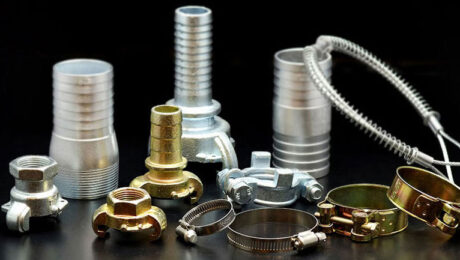Common Camlock Coupling Mistakes & How to Avoid Them
Friday, 31 October 2025
Camlock couplings are famously reliable, but even the best equipment can fail if used incorrectly. These common mistakes lead to downtime, product loss, safety incidents, and unnecessary costs. Learn how to identify and avoid these pitfalls to ensure your operations run smoothly and safely. Mistake #1: Mismatching Coupling Types The Error: Trying to connect two male (Type
- Published in Blogs
How to Connect and Disconnect Camlock Couplings Safely
Thursday, 23 October 2025
Camlock couplings are designed for safety and efficiency, but only when used correctly. Improper operation can lead to sudden releases, spills, and workplace injuries. This step-by-step guide will ensure you and your team handle Camlock couplings safely every time. Before You Begin: Essential Safety Precautions Personal Protective Equipment (PPE): Always wear appropriate PPE, including safety glasses, gloves, and chemical-resistant
- Published in Blogs
How to Choose the Right Camlock Coupling: A 5-Step Buyer’s Guide
Monday, 13 October 2025
Selecting the wrong Camlock coupling can lead to leaks, chemical incompatibility, equipment failure, and serious safety hazards. This frustration is entirely avoidable. Our simple 5-step buyer’s guide will give you the confidence to choose the right Camlock coupling for your specific application, ensuring optimal performance, safety, and cost-effectiveness. Step 1: Identify the Fluid or Media The chemical composition of
- Published in Blogs
Understanding Pressure and Temperature Ratings for Camlock Couplings
Thursday, 09 October 2025
Using a Camlock coupling within its specified operating limits is non-negotiable for safety and performance. Exceeding these ratings can lead to catastrophic failure, causing leaks, equipment damage, or personal injury. This guide will explain how to interpret and apply pressure and temperature ratings for your Camlock couplings. Introduction to Camlock Ratings Every high-quality Camlock coupling is designed and tested to perform
- Published in Blogs
The Materials Guide: Stainless Steel vs. Aluminum vs. Polypropylene Camlocks
Thursday, 02 October 2025
Selecting the correct Camlock coupling type is only half the battle. Choosing the right material is equally critical for ensuring safety, longevity, and system integrity. The three most common materials are Stainless Steel, Aluminum, and Polypropylene. This guide will help you choose the best one for your application. Why Material Selection Matters The material of your Camlock coupling determines its: Chemical Compatibility: Resistance to corrosion
- Published in Blogs
Camlock Coupling Types: A Complete Guide to A, B, C, D, DP, E, F, M Adapters
Tuesday, 23 September 2025
The universal adoption of Camlock couplings is largely thanks to their standardized typing system. This system ensures that couplings from different manufacturers can interoperate seamlessly. Understanding these Camlock coupling types is the most critical step in building a safe and functional fluid transfer system. Introduction to Camlock Coupling Types Camlock types are identified by letters (A, B, C, D, E,
- Published in Blogs
What is a Camlock Coupling? | The Ultimate Guide to Cam & Groove Couplings?
Wednesday, 17 September 2025
What is a Camlock Coupling? A Comprehensive Guide If you work in industries like manufacturing, chemical processing, or agriculture, you’ve likely encountered a Camlock coupling. But what exactly is this ubiquitous device, and why has it become the go-to solution for quick and secure fluid transfer? This ultimate guide will explain everything you need to
- Published in Blogs
The Future of Camlock Couplings: Innovation and Adaptation to Emerging Industries
Monday, 25 August 2025
Camlock couplings, with their simple yet effective design, have become an integral part of industries requiring secure and efficient fluid transfer. Originally developed to address the challenges of quick and reliable hose connections, camlock couplings have since evolved to meet the demands of a variety of sectors, from agriculture to oil and gas. As industries
- Published in Blogs
The Development History of Camlock Couplings
Monday, 18 August 2025
Camlock couplings, also known as cam and groove fittings, have played an essential role in fluid transfer systems for decades. Their simple yet effective design, combining ease of use with secure connections, has made them indispensable in various industries. From their humble beginnings to their widespread use today, the history of camlock couplings is a
- Published in Blogs
Camlock Couplings in Australia: Understanding the AS Standard
Tuesday, 05 August 2025
Camlock couplings are widely used across Australian industries for efficient fluid transfer in mining, agriculture, and industrial applications. Unlike the NPT standard in North America or BSP in the UK, Australia primarily follows the **Australian Standard (AS)** for camlock connections. This article examines the AS standard for camlock couplings, its key specifications, and implementation best
- Published in Blogs


